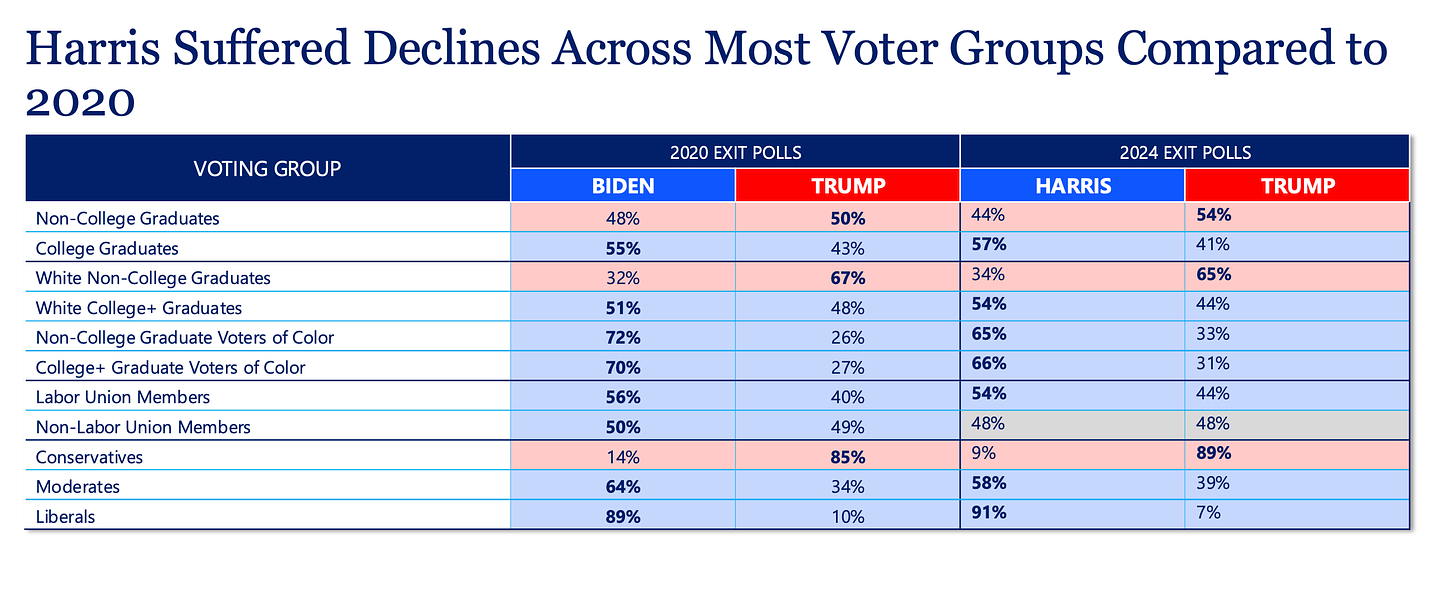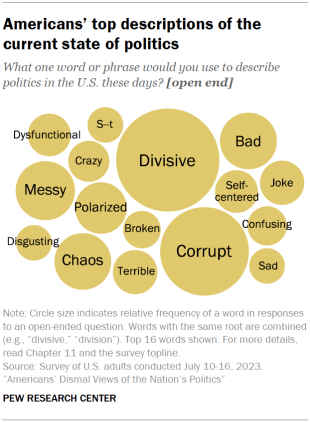How Dems Can Start Staging a Comeback
Dems are in our worst position in 20 years, there is no time like the present to start charting the path back
Poring through the aftermath of a brutal defeat, Democrats are now in their worst position in at least 20 years. Republicans have the White House and the Senate and an excellent chance to capture the House. Trump is only the second Republican since 1988 to win the popular vote, and he made huge gains across the country, building a multi-racial working-class coalition.
For many of you, I imagine this is painful to read. Trust me. It is even more painful to write. Most of my career has been spent within the machinery of the Democratic Party. I worked in the White House and Senate leadership. I worked for Democratic governors and other party organizations. It pains me to see the party in this state of disfavor only eight years after Barack Obama left the White House. The coalition that Obama built has crumbled.
There are millions of reasons why we are in this position — COVID, inflation, an unpopular President, several political miscalculations, and a failure to adapt to a changed media environment. Ultimately, I am less interested in how we got into this mess than in how we get out of it.
The press continues to second-guess and Monday-morning quarterback various tactical decisions of the Harris campaign. I am also not particularly interested in that debate. Two things can be true at the same time. Kamala Harris ran a great campaign in a brutal political environment under an impossible timeline, and Democrats just got their ass kicked by a failed President and convicted criminal who could have been sentenced to jail if he lost the election.
Where Democrats go from here is a conversation that will be an ongoing part of this newsletter in the months to come.
There is no singular or simple answer, and many strawman arguments are being offered up on Twitter and cable. The solution is more complex than being more left or centrist or less woke. I don’t have the answers. Like the rest of you, I am still processing what happened on Tuesday. As part of my personal therapy, I wanted to do a bit of brain dump on the road ahead for Democrats as we confront another four years of Trump.
1. Recognize the Scale of the Problem
On one level, Trump’s win isn’t that big. His popular vote margin will end up being lower than Hillary Clinton’s when she lost the Presidency. This was far from a landslide. It looks nothing like Reagan’s victories in 1980 and 1984 or Obama’s win in 2008. But we shouldn’t sugarcoat the size and scope of Trump’s victory.
Trump improved on his 2020 performance nearly everywhere in the country and with every type of voter. There was a six-point shift to the right in the country from 2020. Trump did 10 points better in Democratic strongholds like New York, New Jersey, and Rhode Island. He gained ground with men, women, Latinos, Black voters, and voters under 30. This chart from Democratic strategist Doug Sosnik shows how widespread Trump’s gains were:
If the GOP can maintain that coalition post-Trump, Democrats will have no shot at the White House or the Senate for the foreseeable future.
We are in a deep hole, and because of that, it is essential that we contemplate radical solutions about how we communicate, campaign, and govern. Every option should be on the table and every prior should be questioned. Yes, it was a brutal political environment, but this failure was a long time in the making.
2. Understand Why We Keep Losing on the Economy
Post-COVID inflation is the biggest factor in this election. It’s why incumbent parties all over the world have been getting slaughtered in election after election. It’s almost impossible to win an election when, according to the exit polls, 68% of voters rate the economy negatively, 75% say inflation caused them harm, and only 24% of voters say their financial situation is better off than four years ago. But if Democrats just blame inflation for voter distrust on the economy, we will be whistling past the graveyard. Democrats have lost economically-focused voters in every election since 2012. Even in the 2018 and 2022 midterms, which saw huge Democratic gains, we lost the voters who said the economy was their top issue by an average of 36 points!
President Biden passed a bunch of very consequential and popular policies. Yet, his ratings on the economy worsened over time. While I think we should revisit our policy agenda to look for new, bolder ideas that better speak to people’s concerns, this is largely not a policy problem. It’s a brand problem. When you do a blind taste test, our policies are more popular. This is why ballot initiatives like raising the minimum wage and allowing collective bargaining often pass in very Red states where Democrats have no chance of winning elected office.
On economic issues, Democrats have a cultural problem; regardless of our policies, voters in the toughest economic situations simply don’t think Democrats care about them, and they haven’t since Barack Obama left office. Republicans have done an excellent job — with some inadvertent help from Democrats — branding our party as the party of elites even though the GOP standard bearer is a wannabe billionaire who offers tax cuts to other billionaires in exchange for campaign contributions. There is little question that we would benefit from more full-throated populism.
Our first opportunity to reset the narrative will happen this year when Trump and the Republicans try to pass a massive tax cut for corporations and the wealthy. The original Trump tax law was one of the most unpopular pieces of legislation in recent memory. Trump ran on lowering costs for working and middle class families, but his first act will be a massive tax giveaway for the corporations doing the price gouging. We need to make him pay for that with the most aggressive, loudest, united communications effort the party has mustered since Trump tried to repeal Obamacare.
3. Close the Communications Chasm
Democrats are losing the information war. Trump and the Republicans are relentlessly communicating their narrative to a wide swath of the electorate, while Democrats are mostly still playing by an old set of rules. The Right is dominating the information space. In the battleground states where Democrats could spend more than a billion dollars communicating to voters on TV and digital platforms, Trump gained three points over his 2020 performance. In the rest of the country, which saw no paid Democratic messaging, Trump gained six points. This means that Democrats got absolutely battered in earned and social media. An average American who just turned on their TV or unlocked their phone or tablet was getting much more pro-Trump and anti-Democratic messaging.
This situation is not unique to the Harris campaign. It’s been a problem for Democrats for more than a decade. Democrats cannot reach the wide swath of voters who don’t actively consume political news. According to polling from Data for Progress, here’s the statistics showing how people voted based on the amount they paid attention to political news:
a great deal: Harris +8
a lot: Harris +5
a moderate amount: Trump +1
a little: Trump +8 -
none at all: Trump +15
If you read the New York Times or watch CNN, Democrats know how to reach you. The problem is that we already have those voters. It's very clear that most of Democratic communications is a circular conversation with the people who already agree with us on everything. The rest of the electorate can’t hear us. They are getting no countervailing information to counter the Right Wing caricature of Democrats. Because of Fox News and other Right Wing outlets, Republicans have long had an asymmetric media advantage. However, in recent years, Right Wing messaging has come to dominate non-political online spaces centered on topics like comedy, gaming, gambling, and wellness.
Most Democrats continued running the same communications playbook for the entire Trump era despite massive changes in the media ecosystem. We haven’t incubated our progressive political media enough nor have we been willing to go into the non-political spaces where the most critical segment of voters are getting their info. To shorthand a longer conversation, Democrats need to go on Rogan and start finding our own Rogans. I promise to write a lot more about this topic in the coming days and weeks.
4. Address Our Establishment Problem
Americans hate politics right now. According to data from Pew Research:
Just 4% of U.S. adults say the political system is working extremely or very well; another 23% say it is working somewhat well. About six-in-ten (63%) express not too much or no confidence at all in the future of the U.S. political system.
Positive views of many governmental and political institutions are at historic lows. Just 16% of the public say they trust the federal government always or most of the time. While trust has hovered near historic lows for the better part of the last 20 years, today it stands among the lowest levels dating back nearly seven decades. And more Americans have an unfavorable than favorable opinion of the Supreme Court – the first time that has occurred in polling going back to the late 1980s.
When you ask Americans to describe the current state of American politics, here’s what they say:
In other words, they hate politics and politicians. At the same time, Democrats, despite this data, embraced being the political establishment. We talk like politicians force-fed focus group soundbites. We have spent much of the Biden era running as the saviors of democracy. It is a theoretically admirable position, but one that made us the defenders of a political system that most voters feel has failed them. Kamala Harris wisely pivoted away from Biden’s ill-advised approach, but the damage was done. In the exit polls, 28% of voters prioritized a candidate who represented change, which was second behind the 30% who wanted someone with the ability to lead. Harris lost the change voters by 50 points!
The die was cast for Harris as the vice president to an unpopular President forced into a race with only 100 days to go. How could she have represented change?
Going forward, Democrats need to speak to voters disgust with politics. We should become the party of reform — the folks who want to get the money and corporate influence out of politics.
We failed to do that in the Biden Administration — we did not push a reform agenda when we had power. We didn’t stop members of Congress from trading stocks, and we stood by while multiple members of our party were indicted for corruption.
Donald Trump’s second term will undoubtedly be riven with corruption and conflicts of interest. He is about to embody everything everyone hates about politics. Democrats need to be the solution, but that means being willing to anger the lobbyists and corporations upon whose succor too many of our members depend.
This is just the beginning of a longer conversation. I will spend the next several months thinking (and writing) about how we got here and where we need to go. I hope to hear your thoughts, ideas, and questions.
Don’t give up hope. This moment feels a lot like 2004 after George W. Bush was reelected. Like Trump, Bush had made real inroads into the Democratic coalition. Pundits were talking about a “permanent Republican majority.” Two years later, the Democrats took the House and the Senate. Two years after that, Barack Obama won the presidency in a landslide. We can get there if we ask the hard questions and do the work.






You want to know how to make a comeback? Democrats have to stop saving the GOP from itself. JVL at the Bulwark has it right. Let America feel the pain. Let Trump’s party repeal the ACA, pass a nationwide abortion and IVF ban, ban contraception, slap their tariffs, make us sicker outlawing vaccines, and deport legions of migrants and their families. Let them gut the federal govt so when these voters need to call someone at the VA or SS, no one is there to help.
Before the OKC bombing, Antigovernment sentiment was fierce. The impact of McVeigh’s mass killing and his target reminded America that the “hated government” was our neighbors, our friends, our family members, our children. McVeigh thought he was sparking a second American Revolution, which people claimed they wanted. Until they were forced to face the horrifying, tragic truth.
I do not feel sorry for these voters who chose to allow a convicted felon, sociopathic liar, rapist, racist, and insurrectionist to lead the (soon to be once) greatest nation on earth. I want them to squeal like gored pigs when the chickens come home to roost. I do feel sorry for the rest of us who will have to endure what is to come.
And you know what else Dan? Stop the circular fire squad. Stop dumping on Dems. The right doesn’t do it, nor should we. And don’t give me hokum about “that’s what sets us apart.” It only adds to the message that Dems suck so much they hate each other. You can’t successfully fight the enemy with an army in disarray.
And stop acting like the Dems were destroyed and are now rudderless and leaderless. JFC, no one talked like this about the GOP after the blue waves of 18, 20, and 24. We have a deep bench. Yes, there are serious issues we must address and get better at. But constant nitpicking and second guessing doesn’t make things better, only worse.
I am 63 and I feel it’s broken for the rest of my life. I feel it’s time to radicalize and put forward an angry politics.
A massive wealth tax. Break up big corporations. Fundamentally reform a justice system that lets powerful felons delay and avoid consequences for crime.